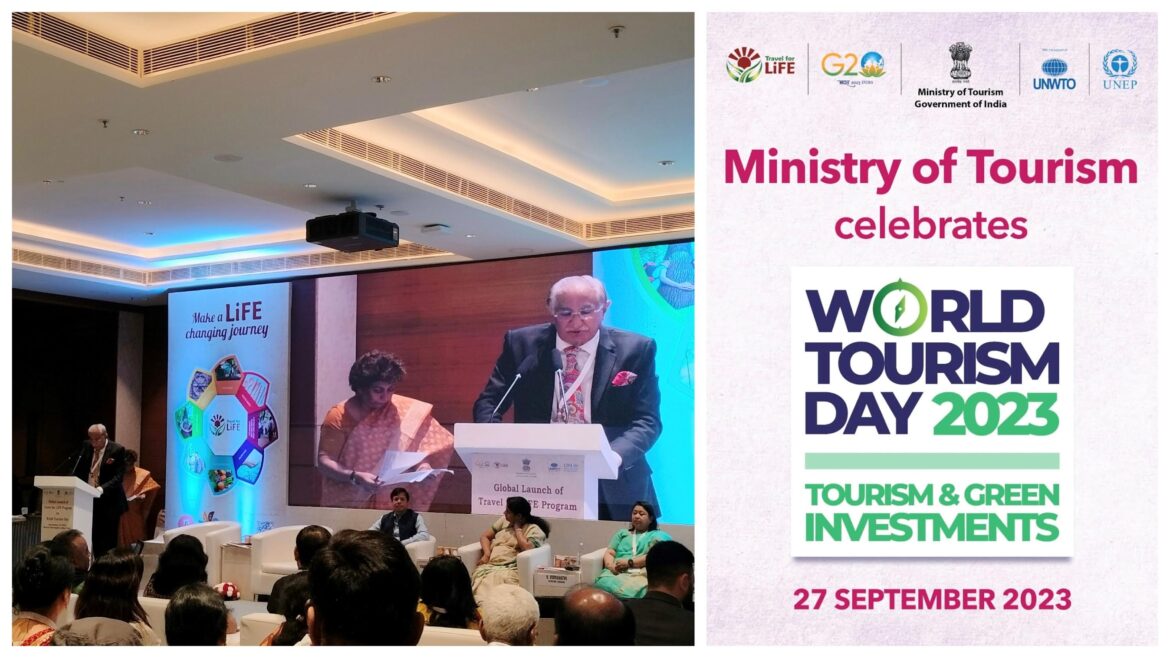India’s Quest for Sustainable Tourism
In a world grappling with the complexities of climate change, India emerges as a beacon of hope in the tourism industry’s pursuit of sustainability. Nakul Anand, Chairman of the Federation of Associations in Indian Tourism & Hospitality (FAITH), envisions a $3 trillion tourism GDP for India by 2047, backed by 100 million foreign tourist arrivals, 20 billion domestic tourism visits, and over 200 million direct and indirect tourism-related jobs. Against this backdrop, the Ministry of Tourism’s groundbreaking initiative, ‘Travel for Life,’ shines a light on the path toward sustainability. Let’s delve deeper into this visionary movement and India’s pivotal role in shaping its future.
A Global Stage for Sustainable vision
On the auspicious occasion of World Tourism Day, ‘Travel for Life’ was unveiled—a pioneering initiative by the Ministry of Tourism. The event drew luminaries such as Mr. Ajay Bhatt, Minister of State for Tourism, and Mr. Atul Bagai, Country Head of UNEP. With Ms. Leena Nandan, Secretary of the Ministry of Environment, Forest and Climate Change, and other esteemed guests in attendance, it was a momentous launch. ‘Travel for Life’ is a dedicated effort to promote sustainability within the tourism sector, aligned with ‘Mission Life,’ a larger initiative championing sustainable tourism practices. The global launch saw participation from G20 nations, international organizations, and states, setting the stage for transformative change.
India’s Remarkable Strides in Sustainable Tourism
India stands out as one of the few countries that have made significant strides in reshaping their tourism industry based on eco-friendliness, youth appeal, and sustainability. The introduction of the G20 Tourism and Sustainable Development Goals dashboard serves as a potent tool to keep the industry accountable in its journey to achieve sectoral goals by 2030. The nation’s commitment to responsible tourism and eco-conscious practices is evident in its ambitious goals.
The Challenge of Balancing Progress and Preservation
Nakul Anand recognizes the tourism sector’s potential as a torchbearer of responsible and sustainable development in the face of climate change. However, the industry faces a critical challenge: striking a balance between economic development and ecological preservation. To fulfil commitments made under the Paris Agreement, where nations aim to limit global temperature increases to below 2°C (preferably 1.5°C), the tourism industry must address its sustainability concerns.
Tackling Tourism’s Carbon Footprint
The current travel and tourism model, as it stands, is unsustainable, contributing an estimated 5.2 gigatons of carbon emissions annually—equivalent to 9% to 12% of total global greenhouse gas emissions. To align with the Paris Agreement’s goals, emissions must be reduced significantly, aiming to lower them from 5.2 to 3.1 gigatons, preventing the projected 6.2 gigaton rise. Acknowledging this challenge, Nakul Anand expresses gratitude to Prime Minister Narendra Modi and the Ministry of Tourism for pioneering ‘Travel for Life’ under the Mission Life directive—a strategy to harness tourism for sustainable development.
Exemplary Initiatives: ITC Hotels Leading the Way
In the hospitality sector, ITC Hotels stands out as a shining example of responsible luxury and sustainability. Globally, ITC Hotels boasts 23 LEED Platinum Certified properties, with 12 hotels achieving LEED Zero-Carbon Certification and two hotels securing LEED Zero-Water Certification. Remarkably, ITC Hotels has consistently exceeded UN 2030 sectoral targets, recycling and reusing over 99% of solid waste and meeting more than half of its electricity consumption through renewable sources. Innovations like Atmospheric Water Generators at select properties demonstrate that sustainable practices not only coexist with the MICE (Meetings, Incentives, Conferences, and Exhibitions) business model but also enhance planet-positive experiences.
Read more at TravelMail | Follow us on Facebook | Twitter | and Instagram for on-the-go news



